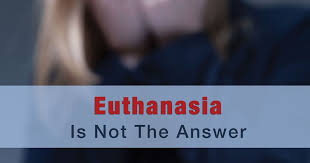This article was published as a guest blog by the disability rights group Not Dead Yet on August 8, 2022 |
| Kathleen Nicole O'Neal |
By Kathleen Nicole O’Neal
On June 16, 2022, a forty-four-year-old Italian citizen named Federico Carboni became the first patient in the history of his country to die by medically assisted suicide. Twelve years ago, Carboni was working as a trucker when he found himself seriously injured in a traffic accident that put him into a coma. When he awakened from the coma, he was a quadriplegic.
What I find most haunting about Carboni’s death are some of his last words, statements that he made explaining his decision to seek medically assisted suicide. Said Carboni, “I do not deny that I am sorry to take leave of life. I would be false and a liar if I said the opposite because life is fantastic, and we only have one. But unfortunately, it went like this. I have done everything possible to be able to live as well as possible and try to recover the maximum from my disability, but by now I am both mentally and physically exhausted. I do not have a minimum of autonomy in daily life, I am at the mercy of events, I depend on others for everything, I am like a boat adrift in the ocean. I am aware of my physical condition and future prospects so I am totally calm and calm about what I will do.”
What I find haunting about this is that ultimately this is an indictment of a terrible personal care services (aka caregiving) system, a system that fails to pay workers enough to create a reliable workforce and a system that fails to grant disabled people sufficient authority to control their services. Even the most physically disabled people should feel independent and empowered by their attendant services and apparently this is not what was happening in Carboni’s life.
To take one well known example, Stephen Hawking was a severely physically disabled person who nonetheless exercised great autonomy in his life. Even after his diagnosis of amyotrophic lateral sclerosis, Hawking would go on to get married, publish books, and lecture internationally. He was not “at the mercy of events”; he was a figure who actively shaped scientific history. And while Hawking’s genius is remarkable, the resources which he had at his disposal in order to live his life on his own terms should be available to all disabled people everywhere in the world.
When a disabled person says that they “do not have a minimum of autonomy in daily life,” then that is an indictment of a society and a system that disrespects their equality and civil rights. And the solution to this is not to push assisted suicide as the way to deal with medically complicated individuals – it is to seek to ensure the autonomy of the disabled person in the personal care services relationship. Simply put, assisted suicide is not a solution but an extension of the devaluation disabled people experience. It’s like saying, “Disability equals no autonomy so prepare to die.”
Those who support assisted suicide have attempted to frame the issue as one of personal choice. Hence, the once appropriately named Hemlock Society now euphemistically and misleadingly refers to itself as Compassion and Choices. But what happens to disabled people all too often involves a lack of both compassion and choices and assisted suicide is not the answer to this reality.
In reality, needing care need not be a horrible thing. Says UK disability advocate Lucy Webster, “The things that I have enjoyed and been most proud of would not have happened without good care. From experiencing university (the studying and the partying) to holidaying in far-flung places, my life has been made possible by the young women who help me.Without them, I wouldn’t have the countless warm memories of nights spent at the theatre, or gossiping and dancing with pals. It is impossible to conceive of being able to work without my PAs – I certainly wouldn’t have had the opportunities that led to me writing this column. But I have, and you are reading it, and I cannot see anything to pity in that.”
All disabled people should have excellent personal care attendants of their choice on demand. These are the real choices which we need in our society, but these are not the choices that are being framed for us in reference to medical assistance in death. Instead we are presented with phony “choices” – live with absolutely appalling, or even non-existent, services or die.
Federico Carboni did not deserve the death penalty. He deserved what Lucy Webster has. He deserved attendant services that centered his autonomy, his needs, his wants, his wishes, and his will. His life would have been different had he had that opportunity. We as a culture need to get over this notion that needing help with physical bodily functions is an affront to one’s dignity. This is the logic of ableism.
Assisted suicide is so often framed as an autonomous choice, but when you listen to the words of those who choose it, their lack of autonomy in making any choices in their lives comes barreling to light. There are many ways in which this troubling reality plays out in the lives of those individuals who find themselves targeted by assisted suicide laws and policies. For instance, in a groundbreaking 2019 report by the National Council on Disability entitled The Danger of Assisted Suicide Laws, the report’s authors write, “When assisted suicide is legalized in the context of the US healthcare system, it immediately becomes the cheapest treatment. Direct coercion is not necessary. If insurers deny, or even simply delay, approval of expensive life-sustaining treatment, patients can be steered toward hastening their deaths – and sometimes insurers help them to do so.”
We need to get over the notion that it is “undignified” for people with disabilities to need help. That’s ableism. And we need to quit pretending that those dying by assisted suicide are authors of an autonomous act of personal liberty. Instead of providing resources for these individuals to live autonomous lives and for their caregivers to be justly compensated economically for their work, we as a society are taking the easy way out and leaving little choice but for sick and disabled people, old or young, to kill themselves.
Assisted suicide represents a failure of society and that is what we need to recognize first and foremost about this phenomenon. We do not need to cooperate with the reframing of capitalist genocide of people with disabilities as a personal choice. Disabled people with autonomy don’t kill themselves. And if they lack autonomy, that is an indictment of the systems and individuals around them. “Compassion and Choices” is about anything but.








.png)
.JPG)









.png)

